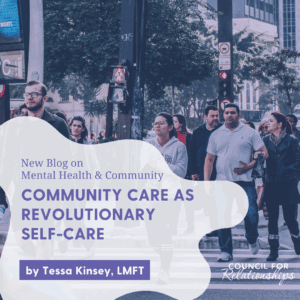Community Care as Revolutionary Self-Care: Mental Health & Community in Practice
Has your therapist ever encouraged you to focus on self-care? Typically, self-care refers to the things we do to maintain our health, like nutrition, exercise, rest, and going to therapy or the doctor. Even so, while self-care may sound simple, many of us still struggle to prioritize it. This may be because we didn’t grow up seeing self-care—or community care—modeled for us. Many of us didn’t learn how to care for ourselves or each other in our first families. As a systemically minded relationship therapist, I help clients explore how revolutionary self-care can deepen their mental health and community connections.
Rethinking Self-Care: From Individualism to Revolutionary Community Care
Access to self-care is not equal. While good-intentioned, self-care rhetoric can be steeped in Western Individualism. This version of self-care tracks with a “bootstrap” mentality that places all responsibility on the individual and ignores larger systemic factors.
We live in a white-supremacist, cis-hetero, patriarchal, capitalist society. In other words, each part of this system centers power and access around whiteness, straightness, maleness, and wealth—while excluding or exploiting those who do not fit within those categories. This system distributes resources unevenly. Additionally, those with the least resources need the most care due to the impact of these systems. Systemic barriers to care include work schedule, finances, childcare, geographical access to goods and services.
Importantly, human beings are interdependent social creatures. Our well-being is tied to those around us, as well as the well-being of our plant, animal, and earth counterparts. In the 1970s, the Black Panther Party encouraged Black folks to prioritize looking after their health and well-being, noting that this was essential to remain resilient in the face of relentless systemic and medical racism. The party revolutionized community care centers and public health initiatives. The Black Panther Party embedded these programs in a larger political strategy.
Why Revolutionary Self-Care Still Matters Today
For example, the Black Panthers recognized that the larger systems do not look out for marginalized people, and that communities have to take care of each other. This is revolutionary self-care and community care. It is self-care and community care rooted in resistance—it centers survival, collective healing, and mutual support in the face of oppression.
Making Space for Community Care: Therapy, Support, and Shared Well-Being
To begin with, self-care is integral to our well-being. Unfortunately, Capitalism has reshaped the idea of self-care to promote buying things rather than caring for yourself. When you consider making a purchase in the name of ‘self-care,’ pause to reflect. Who is benefiting—or profiting—from that choice, and does it align with your values? Often, the most effective self-care practices cost time, not money: journaling, drinking water, taking a walk, or calling a supportive friend.
Community care involves a balance of taking care of ourselves, taking care of others, and allowing ourselves to receive care. Therapy can be a place to address blocks to any of these skills.
Struggling to care for yourself can stem from many places. You may not have had self-care modeled by your caregivers. You might find it difficult to summon the energy or motivation. Or perhaps you do not feel deserving of care in the first place.
Caring for others can also feel complicated. You may have been socialized to overlook the needs of those around you. In some cases, you might have been so attentive to others in the past that you now feel burnt out. Individualistic legacies may also lead you to view your well-being as separate from—or even competing with—the well-being of others.
Receiving care can bring up its own set of challenges. You may not feel worthy of support or worry about burdening others. Asking for help or sharing openly when you are in need might feel unsafe or unfamiliar.
Therapy, Mental Health, and Community Support
Ultimately, therapy is the place to work through these deeply ingrained patterns of giving and receiving care. As you become aware of your patterns, you can begin to practice new habits. These habits can change how you understand yourself and relate to the world. And remember, a self-care routine is not complete with community care! Spend some time considering how you can pour into those around you.
At Council for Relationships, we are committed to providing therapy to the Philadelphia community, regardless of ability to pay. Our intern clinicians provide these services with support from a wide network of staff members.
Editor’s Note: The views expressed in this blog are those of the author and do not necessarily reflect the official policy or position of Council for Relationships.
Continue Your Journey Toward Healing and Connection
No matter where you are in your journey—whether just beginning to explore self-care or seeking deeper community support—therapy can help you move forward. At CFR, we believe healing happens through both personal insight and connection to others. The path toward well-being is not one you must walk alone—community care makes that journey more sustainable and meaningful.
About Philadelphia Marriage & Family Therapist Tessa Kinsey
Tessa Kinsey, LMFT, is a systemically oriented clinician who helps clients explore how community care, mental health, and personal relationships intersect. She works with individuals and couples navigating life transitions, identity development, and intergenerational dynamics. Her approach draws from mindfulness, attachment theory, psychodynamic therapy, and liberation psychology.
Tessa’s work is rooted in the belief that revolutionary self-care involves more than individual routines—it includes building trust, challenging harmful patterns, and finding support in community. Clients appreciate her warm and grounded presence, especially when exploring the emotional layers of mental health and community connection. Tessa sees clients at Council for Relationships’ University City office in Philadelphia and online.
More on Community Care, Revolutionary Self-Care, and more from CFR
Here’s how Council for Relationships can support your next step. Council for Relationships has over 80 expert therapists and psychiatrists who offer integrated care grounded in compassion, expertise, and accessibility.
- Get matched with a CFR therapist who’s right for you
- Explore more blogs on community care, identity, relationships, and self-compassion
- Sign up for our email list to receive mental health resources, event updates, and therapist insights
Community care starts with connection. Let’s take the next step—together.


